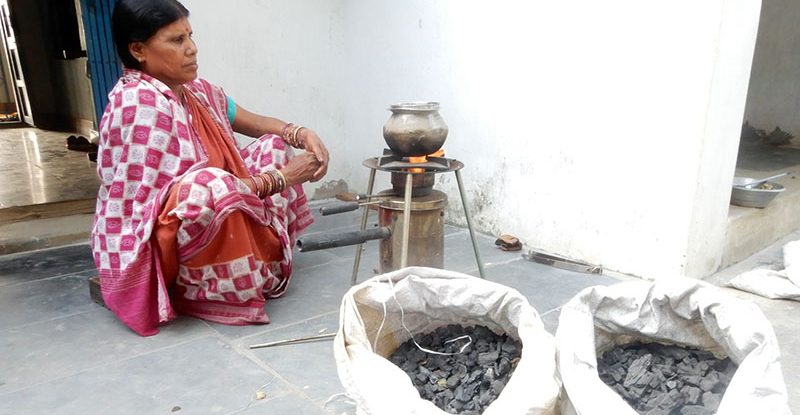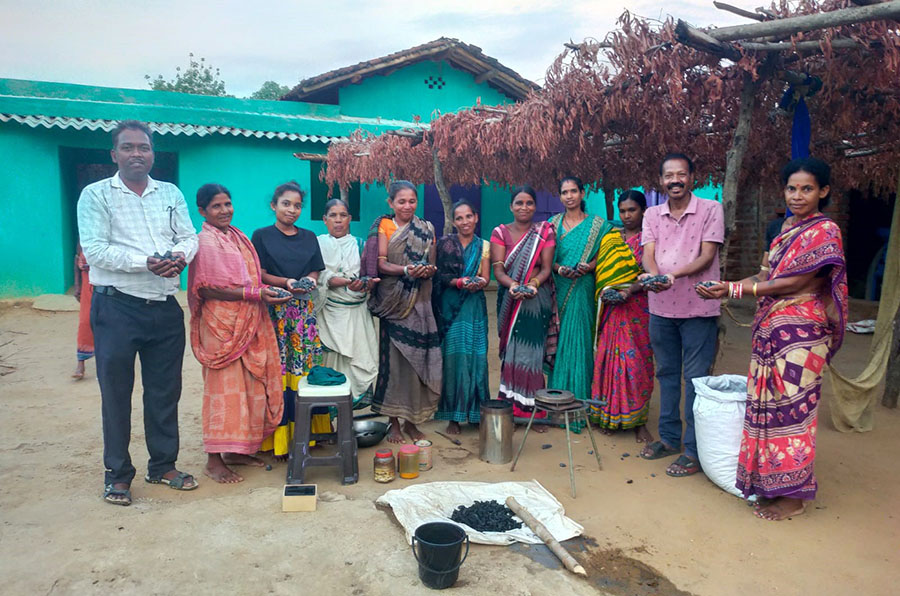
Women cooking at home in Balangir and Nuapada districts in eastern India’s Odisha State rely heavily on firewood-fed mud chulhas (stoves). They are also largely responsible for collecting and carrying the firewood, which is time- and labor-intensive.
The chulhas make for smoky indoor spaces, polluting the air and causing respiratory issues for these women and their families. Another major contributor to air pollution in the state is the burning of crop residues. These materials are left on cultivated land after the crop has been harvested and are burned to facilitate timely planting for the next crop.
Odisha, a major rice-producing state, generates about 20 million tonnes of agricultural residue every year – around 1.34 million tonnes of which is burned, resulting in air pollution and increased carbon emissions. The area’s agricultural sector, which 60 percent of the state’s people depend on for their livelihoods, faces ongoing challenges from extreme weather events, diminishing soil fertility, and the high cost of mineral fertilizers.
Into this milieu, a recent Centre for International Forestry Research and World Agroforestry (CIFOR-ICRAF) programme sought to tackle the twin issues of smoky stoves and diminishing returns from fatigued agricultural soils.
In collaboration with the German Development Cooperation (GIZ), from 2021 to 2023 CIFOR-ICRAF spearheaded a sustainable biochar production intervention that was a testament to the power of approaches that consult men and women from the communities of interest.
The technological part of the project was the introduction of an improved, more efficient smart cookstove that uses less fuelwood and reduces air pollution, while producing biochar as a valuable byproduct that can be worked into soil as a nutrient-rich, organic fertilizer – and a contribution to tackling the climate crisis.
Biochar is a carbon-rich material derived from agricultural or organic waste in the absence, or with low levels, of oxygen. It has the potential to play a crucial role in mitigating the climate crisis by sequestering atmospheric carbon into the soil and converting agricultural waste into clean energy.
“Initially, I wondered what this charcoal-like material could do in my backyard,” said one participant, Birjha Bai Majhi, who lives in the village of Nuapada. “Then I realised that the crops grown in areas where I had incorporated biochar required less water for irrigation,” she said. “I also saw remarkable crop growth in these specific parts of my backyard.”

Project participants with the biochar they produced. Photo by CIFOR-ICRAF
Converting more of the state’s voluminous crop residue to biochar therefore held immense potential to address the issues of smoky homes and increasingly unproductive fields. Using the smart cookstoves, participants’ households experienced an up-to-25 percent reduction in carbon dioxide and particulate matter – both exacerbating factors for respiratory illnesses.
“The introduction of improved cookstoves came as a welcome relief as [women] could cook faster with less smoke,” said Archna Singh, a community-based research scientist at CIFOR-ICRAF in India. “The fact that the stoves could easily be moved around made it easy to adopt them in day-to-day use.”
Community members also found the biochar to be effective as a soil supplement: the initial results of two years of interventions showed an increase in crop yields by up to 25 percent. The expansion of vegetable production in backyard gardens contributed to families’ nutrition, and in some cases boosted their incomes through the sale of surplus produce.
“Agricultural residue, which is typically worthless but costly to get rid of, is now a valuable resource increasing crop yields and generating additional income while improving the lives of the women,” said Aqeel Hasan Rizvi, a programme manager and integrated farming system scientist at CIFOR-ICRAF India. “With the sustainable biochar project, we are demonstrating effective management of the crop residues that has the potential to be replicated at scale.”
The power of inclusion
At the CGIAR’s Gender Impact Platform conference in early October 2023, ‘From Research to Impact: Towards just and resilient agri-food systems’, Babita Bohra – the gender and social inclusion coordinator for CIFOR-ICRAF India – highlighted the program’s interventions towards a gender inclusive approach by integrating gender considerations, adopting gender-sensitive approaches, and enhancing capacity through training programs. Such strategies are pivotal in transforming the lives of women and other marginalized groups.
“The project showcased that a true gender-responsive approach goes beyond checkboxes, focusing on understanding and meeting the diverse needs, capacities, and aspirations of both men and women”, said Bohra.
The project’s researchers designed activities using a gender-inclusive approach. First, they analyzed men’s and women’s farmers’ perceptions on biochar to understand their existing knowledge, access, ease of using the proposed protocols, barriers, and needs in adopting the production and application of biochar.
They then worked to ensure gender-responsive implementation and make sure that both women and men benefitted from the intervention. In particular, the team designed the project activities to address the needs both in the household and in the field by considering their grounded realities. Trainings focused on the operation of cookstoves in the households to produce biochar and on the production of biochar using various techniques in the field. The selling of surplus biochar produced in either way could then result in additional income. The project team also worked with men and women to foster a sense of local ownership, which helped to secure the intervention’s success.
“This project demonstrates the win-win-win opportunity that we have to reduce air pollution, address labor burdens, and support healthy families and soil by following the voices of our diverse men and women community partners,” said Elisabeth Garner, Gender Equity and Social Inclusion (GESI) lead and scientist at CIFOR-ICRAF.
Acknowledgements
The Sustainable Biochar Project, which was active from 2021 to 2023, was funded by the German Ministry for Economic Cooperation and Development (BMZ) through Sector Project Soil Protection, Combating Desertification, Sustainable Land Management (SV BoDen) of German Development Agency (GIZ). It was implemented by CIFOR-ICRAF with the support of the Government of Odisha and the Indian Council of Agricultural Research (ICAR).
We want you to share Forests News content, which is licensed under Creative Commons Attribution-NonCommercial-ShareAlike 4.0 International (CC BY-NC-SA 4.0). This means you are free to redistribute our material for non-commercial purposes. All we ask is that you give Forests News appropriate credit and link to the original Forests News content, indicate if changes were made, and distribute your contributions under the same Creative Commons license. You must notify Forests News if you repost, reprint or reuse our materials by contacting forestsnews@cifor-icraf.org.